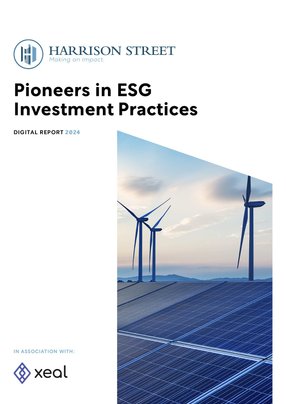Harrison Street: Pioneers in ESG Investment Practices
Harrison Street is a leading investment management firm exclusively focused on alternative real assets whose investment thesis places them in a prime position to positively impact society, the environment and thousands of individual lives, while remaining true to its financial and fiduciary objectives.
Not only does Harrison Street invest in modern housing that provides shelter and a sense of community for students, seniors and military families, its portfolio also includes medical offices and life sciences assets, renewable energy infrastructure and public-private partnerships with universities, health systems and municipalities.
Jill Brosig, Managing Director and Chief Impact Officer at Harrison Street is responsible for overseeing the measurement, management, reporting and enhancement of the firm’s global ESG efforts. In her role, she is well-positioned to drive a positive impact for those it serves.
“Given the asset classes we invest in, Harrison Street has an opportunity to positively impact society, the environment and thousands of individual lives, while remaining focused on positive economic outcomes for our investors,” she explains.
“Through our Climate Action Plan, we work to mitigate climate impact across our portfolio; ensure our assets are resilient to climate change; and prioritise the health and wellbeing of our building occupants all while remaining true to our fiduciary duty.”
Applying sustainable practices to investment management
As an investment firm, Harrison Street has a responsibility to safeguard the value of its investments and maximise returns for its clients and their beneficiaries. Therefore, it is vital that its ESG strategy complements and does not constrain its investment strategy, but rather strives to enhance its assets and benefits its targeted demographics.
“For this reason, our sustainable practices are developed hand in hand with our investment strategy and embedded across every department,” Brosig continues. “We believe our focus on sustainability is fundamental to our commercial success, as our ESG initiatives over the past decade have aided in creating more attractive, higher performing properties.”
When it comes to ESG the corporate tagline is ‘Making an Impact’.
“It is crucial that teams across our operations understand the material ESG factors that affect our assets and integrate practices that can mitigate the risks and leverage opportunities accordingly while driving real-world impact,” Brosig shares.
Strategically enhancing how responsible practices are embedded throughout the lifecycle of an investment, Harrison Street has thoughtfully designed the business to focus on investments that provide a positive impact on societies.
Brosig adds: “The process starts when a deal goes to the investment committee. There we capture, within the IC Memo, the asset’s exposure to climate risks, identification of potential opportunities, existing ESG performance attributes and an aligned diligence plan. At closing, the Investment Team integrates the findings from the ESG diligence activities into the underwriting and corresponding business plan.
“During the hold period of investments, asset ESG attributes and performance metrics are monitored and material ESG KPIs are reported back to key stakeholders. Where applicable to that asset, key sustainability efforts may occur, such as lighting upgrades, low flow water fixture installations, on-site solar or HVAC upgrades.
“Pursuing various building certifications and implementing key social features may also be warranted. Upon disposition of the asset, where applicable, key ESG features are included in the marketing of each sale. Throughout the lifecycle, the firm monitors the impact of any interventions on expenses, valuation and ESG performance metrics to further refine the relevance and importance of ESG factors.”
Building a sustainability programme from scratch
Starting her career journey at Harrison Street more than 10 years ago, Brosig looks back on the evolution of the firm: “When I began at Harrison Street, there was no formal sustainability programme. That is one significant change I’ve experienced first-hand. When the sustainability programme was created 10 years ago, the initial goals were to simply establish a formal committee, create a strategy and participate in GRESB.”
In the years that followed, the initial goals outlined by the firm advanced to focus on improving energy efficiencies at the property level and the retention of its employees. Broadening its definition of corporate sustainability in 2017, Harrison Street adopted a business approach that ‘creates long-term shareholder value by embracing opportunities and managing risks deriving from economic, environmental and social developments’.
A pivotal year for the programme, 2020 sparked the creation of the Impact Department. “What was once solely committee-based work blossomed into a fully dedicated ESG team and resource for the firm, with the appointment of myself as Chief Impact Officer and the adoption of Harrison Street’s corporate tagline ‘Making an Impact’,” Brosig explains “This was also the year that our corporate offices began operating at net zero for Scope 1, 2, and 3 emissions, and the firm became a UN PRI signatory.”
In the last three years, Harrison Street has published a Climate Action Plan detailing a five-year strategy to address carbon emissions reduction, climate risk and social impact. The firm also expanded its journey with Fitwel — which began in 2018 — to pursue Fitwel certification at all occupied properties and expanded the number of EV charging stations installed at various properties.
“This past year has been another momentous year to say the least,” Brosig details. “The firm was the recipient of several prestigious recognitions, including the PREA ESG Momentum Award, several of the Center for Active Design’s Best in Building Health awards — bringing our total to 10 — and Environmental Finance’s Best ESG programme for large companies.”
Standing out from the crowd: Pioneers in ESG practices
As part of its mission, Harrison Street strives to enact pioneering ESG practices before it became a ‘trend’ — and dedicating resources to a standalone impact department with six full-time employees.
Brosig stresses: “We also put immense emphasis on the ‘S’ in ESG, which is something not many other firms have done. ESG is part of our entire investment lifecycle, we make a concentrated effort to capture the economic or financial benefit from our efforts and we also ensure that we bring together key stakeholders to collaborate and share ideas on how to best leverage technologies, processes, and partnerships.”
There is no doubt that there is value in being an early adopter and pioneer in ESG, sustainability efforts will continue to become more urgent and Harrison Street is well situated to continually improve its strategy along the way.
“Reaching our 70% reduction goal will represent a huge achievement but that will only be a starting point,” she says. “Since the firm was founded, our global portfolio has expanded and now encompasses more challenging sectors, including data centres with unique ESG demands.”
Harrison Street aims to extend its targets to cover these new asset classes and embodied carbon, as well as look to enhance its biodiversity strategy.
Brosig continues: “Our work in quantifying the impact of our social initiatives will help us identify which programs have the greatest impact and those which are most closely aligned to financial performance. Using this we can extend best social practices across our assets and shape future social strategy.
“Additionally, our tri-annual stakeholder materiality survey will help us to continue to evolve our practice and shape issues that are most relevant and important to them. And of course, we will continue to invest in our employees, who we believe are our greatest asset.”
Reflecting on the year ahead, Harrison Street will continue to chip away at its target of reducing carbon emissions by 70% before 2025. “We remain on track to meet that goal,” Brosig notes. The firm has spent time quantifying the impact its past building design and operations efficiency-related activities have produced and will begin to capture the impact from its S-related activities.
“Other ongoing initiatives we will continue are increasing our roll-out of on-site solar and the installation of EV chargers. We will learn from the pilots we have run to better understand how to track and measure the embodied carbon in new building developments. And we’re looking deeper at biodiversity and how we can continue to improve how we integrate nature into our property design. Lastly, we’ll continue to expand our tenant engagement activities.”
With real estate representing around 40% of global emissions, and as critical timelines draw near, the investment management industry will be essential in determining how the world responds to climate change. Regulatory scrutiny will likely increase dramatically and unsustainable operations will face huge commercial challenges as resources become more competitive and market expectations shift.
She concludes: “The ESG space has developed massively in the last five years and can be expected to continue to grow in the next few years ahead. As new sustainable practices and programmes are established that offer investors increased returns even slow adopters will be forced to address the opportunities within ESG.”
Make sure you check out the latest edition of Energy Digital Magazine and also sign up to our global conference series - Sustainability LIVE 2024
**************
Energy Digital is a BizClik brand





